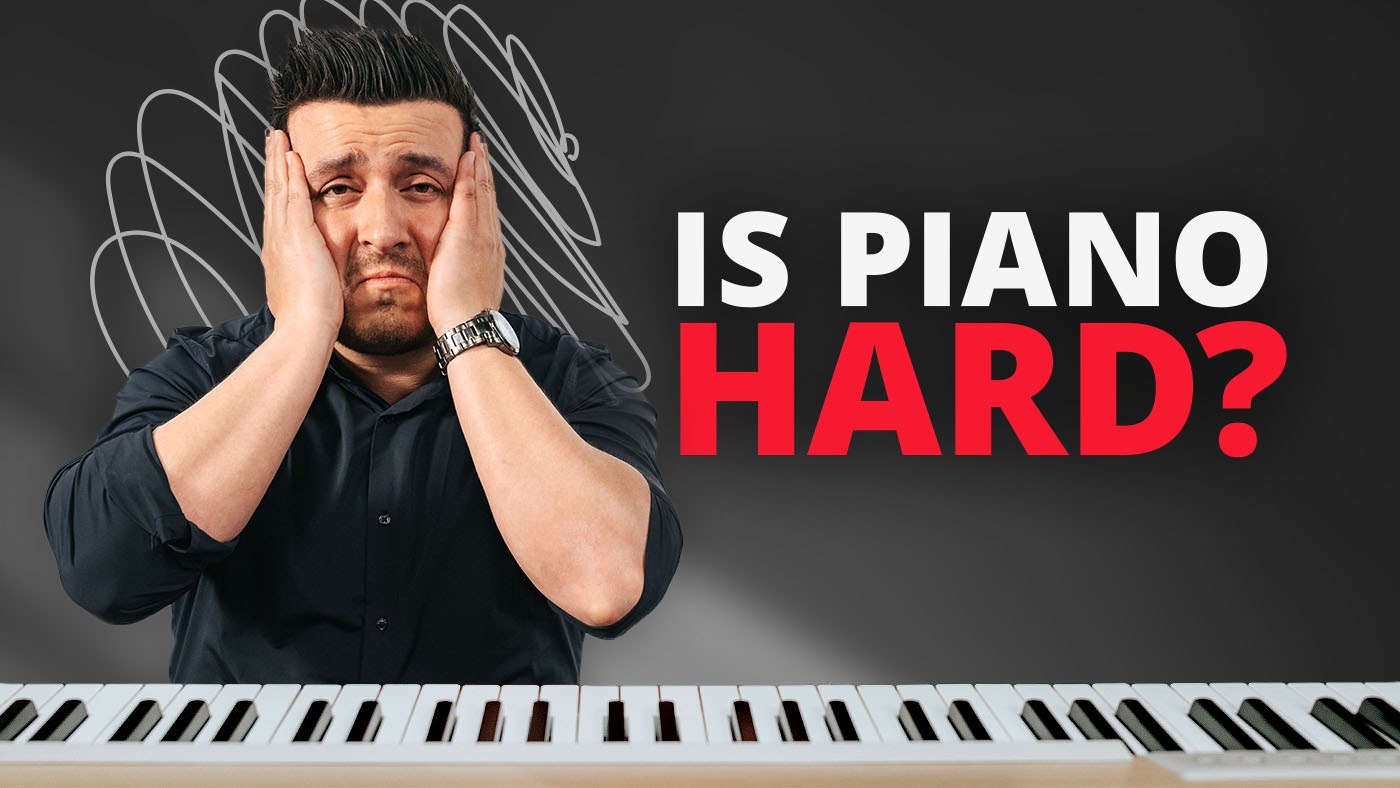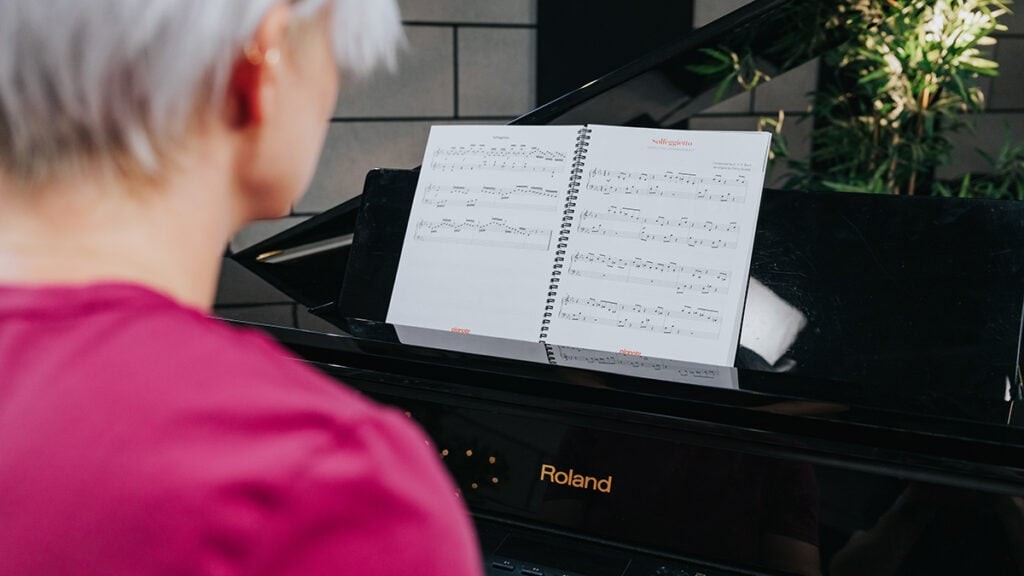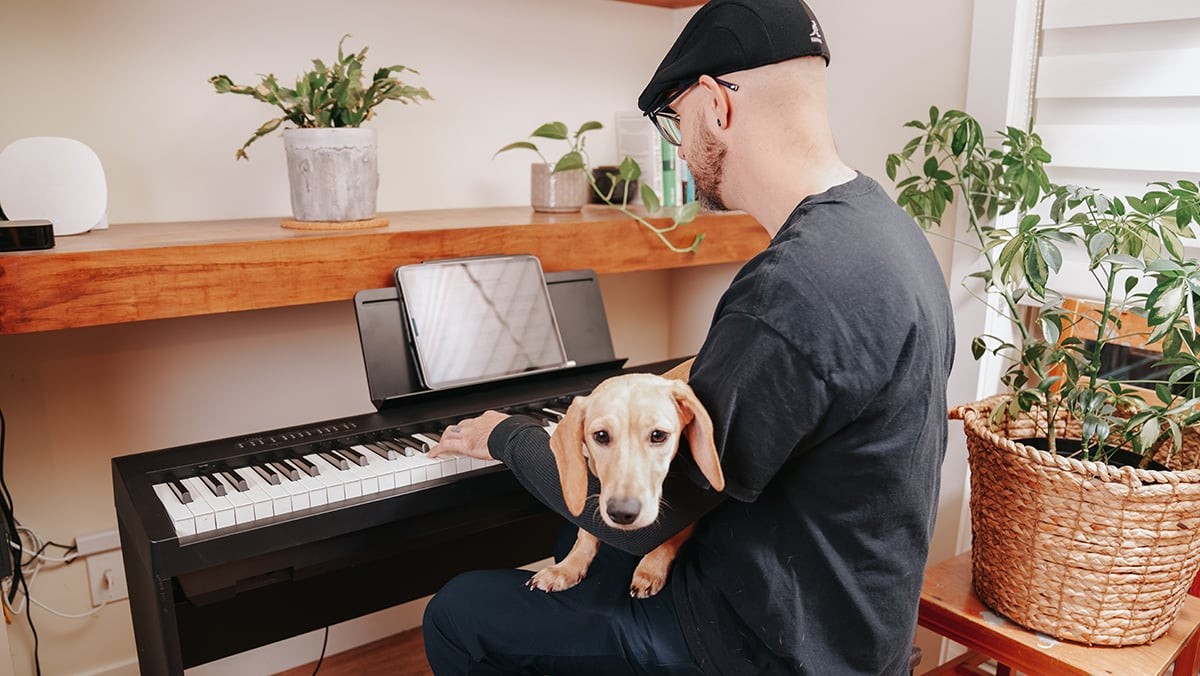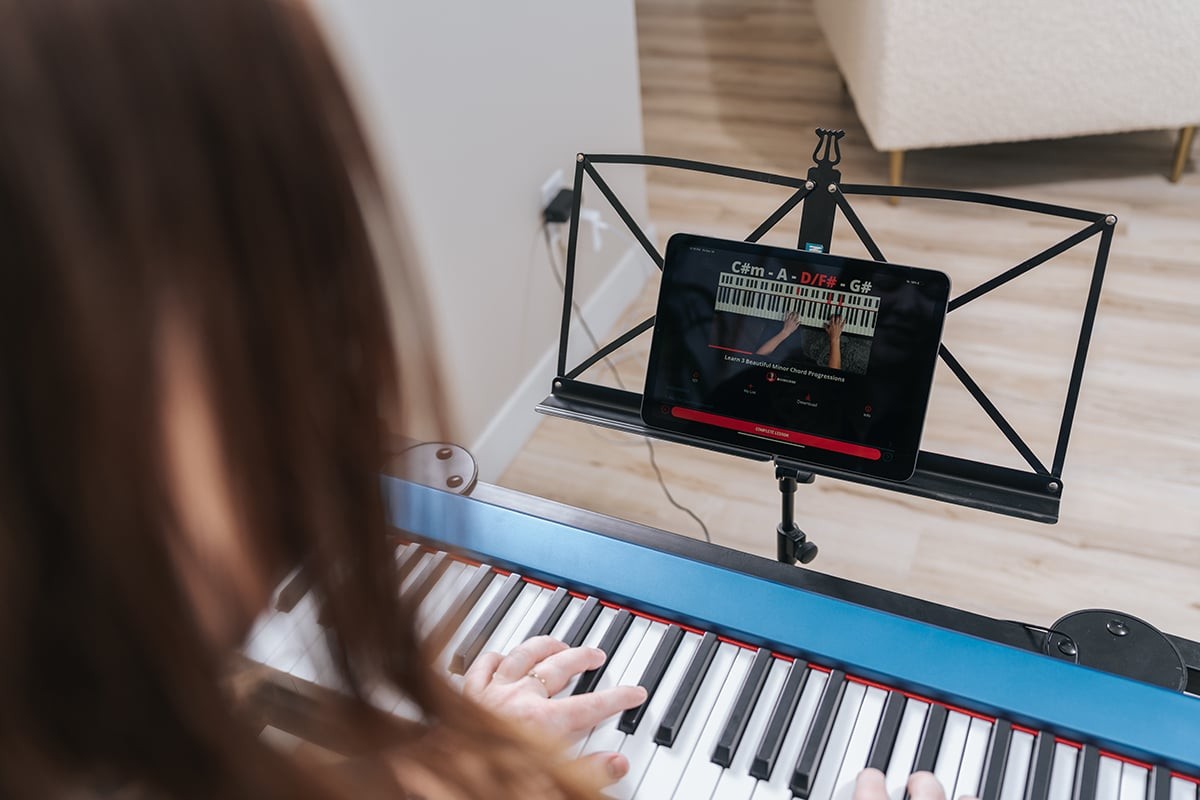Is Learning The Piano Easy? Absolutely, the piano is initially accessible, offering a quick start for beginners; however, mastering it demands dedication and consistent practice, but with the right resources, such as those available at LEARNS.EDU.VN, anyone can progress and enjoy playing the piano. Dive into this guide to explore effective learning methods and useful strategies for piano education.
1. Understanding the Dual Nature of Piano Learning
The piano presents a unique paradox: it’s incredibly accessible for beginners yet profoundly challenging to master. Let’s explore what makes learning to play piano both easy and difficult.
- Initial Accessibility: The piano is straightforward to start with. A complete novice can learn a simple melody within minutes. Unlike other instruments, there’s no tuning required, and no need for specialized techniques to produce a pleasant sound.
- Complexity of Mastery: World-class pianists spend their entire lives refining their skills. Some pieces, like Rachmaninoff’s Piano Concerto No. 3, are notoriously demanding. This highlights the instrument’s capacity for advanced challenges.
2. Challenges in Piano Learning
Several factors contribute to the challenges of learning piano, which can be overcome with the right approach and resources, many of which are available at LEARNS.EDU.VN.
2.1 Hand Independence
One of the primary hurdles for beginners is coordinating both hands.
- Developing Coordination: This skill requires time and practice. Initially, it feels like your hands are disconnected from your intentions.
- Brain Symmetry: Research indicates that pianists develop more symmetrical central sulci in their brains, facilitating better hand coordination (Science Shows How Piano Players’ Brains Are Actually Different From Everybody Elses).
2.2 Reading Sheet Music
Many learners find reading sheet music daunting.
- Learning a New Language: It’s akin to learning a new language, with its own set of symbols and rules.
- Treble and Bass Clef: Piano players must learn both treble and bass clef, adding another layer of complexity. While you don’t necessarily have to learn how to read sheet music, it expands your options.
- Benefits of Standard Notation: Knowing standard notation opens up a world of musical possibilities and allows for deeper understanding.
2.3 Music Theory
Understanding music theory is crucial for piano players.
- Keyboard Visualization: The piano keyboard simplifies the understanding of music theory by visually representing notes in a linear fashion.
- Harmony and Melody: Unlike many instruments that play a single melodic line, the piano allows for the simultaneous creation of melody and harmony.
- Chord Knowledge: This requires a solid grasp of chords and chord theory, which can be complex.
2.4 Accessibility Issues
The cost and physical demands of pianos can be barriers.
- Instrument Cost: Quality pianos are expensive, requiring a significant financial investment.
- Keyboards vs. Pianos: A full-size, 88-key keyboard with weighted keys is essential for proper learning.
- Digital Piano Benefits: Digital pianos offer a viable, more affordable alternative with sophisticated features.
2.5 Practice Requirements
Consistent practice is essential.
- Time Investment: Achieving an intermediate level typically requires four to five years of consistent practice (How Long Does It Take to Learn Piano Survey).
- Persistence: Practice can be frustrating, but persistence is key to improvement.
- Smart Practice: Effective practice habits lead to noticeable progress over time.
3. Strategies to Simplify Piano Learning
While the piano presents challenges, several strategies can make the learning process more manageable and enjoyable. LEARNS.EDU.VN offers many resources that align with these tips.
3.1 Playing Music You Enjoy
Focus on genres and songs that you love.
- Personal Connection: Playing music you’re passionate about increases motivation and enjoyment.
- Tailored Learning: Focus on skills relevant to your preferred music style, whether it’s chord symbols for pop music or advanced techniques for jazz.
- Versatility of Piano: The piano accommodates almost any genre, so explore what resonates with you.
3.2 Experimenting with Different Learning Methods
Explore various teaching styles and resources to find the best fit.
- Diverse Resources: Numerous teachers, programs, books, and online tutorials are available.
- Method Commitment: Stick with a chosen method for a reasonable period (e.g., three months) before switching.
- Hybrid Approach: Combine different methods, such as online lessons with occasional in-person sessions, for a well-rounded education.
3.3 Using Weighted Keys
Practice on a piano with weighted keys to develop proper technique.
- Dynamic Control: Weighted keys allow for nuanced control over volume and expression.
- Realistic Feel: Digital pianos now offer highly realistic weighted action at an affordable price.
- Technique Development: Starting with weighted keys fosters correct habits from the beginning.
3.4 Cultivating Good Practice Habits
Establish effective practice routines and maintain a positive mindset.
- Short Bursts: Even five minutes of practice a day can lead to improvement.
- SMART Goals: Set goals that are specific, measurable, achievable, relevant, and time-bound.
- Embrace Challenges: Expect to encounter difficulties and view them as opportunities for growth.
- Reconnect with Your Why: Regularly remind yourself of your initial reasons for learning piano to stay motivated.
4. The Role of Motivation and Mindset
Maintaining motivation and a positive mindset is critical for success in piano learning.
4.1 Staying Motivated
Motivation can wane over time, so it’s essential to find ways to stay engaged.
- Find a Learning Buddy: Learning with a friend can provide mutual support and encouragement.
- Join a Music Community: Participating in a local or online music community can offer inspiration and shared experiences.
- Record Your Progress: Keeping a record of your progress can provide a sense of accomplishment and motivate continued effort.
4.2 Overcoming Frustration
Frustration is a common part of the learning process, but it can be managed with the right strategies.
- Take Breaks: When feeling overwhelmed, take short breaks to clear your head and return with a fresh perspective.
- Focus on Small Wins: Celebrate small achievements to maintain a sense of progress.
- Seek Feedback: Ask for feedback from teachers or peers to identify areas for improvement.
4.3 Maintaining a Growth Mindset
Adopting a growth mindset—believing that abilities can be developed through dedication and hard work—is essential.
- Embrace Mistakes: View mistakes as learning opportunities rather than failures.
- Persist Through Challenges: Maintain a positive attitude and keep practicing even when faced with difficulties.
- Believe in Your Potential: Trust that with effort and perseverance, you can achieve your musical goals.
5. Practical Exercises and Techniques
Incorporate practical exercises and techniques to enhance your piano learning experience.
5.1 Finger Exercises
Finger exercises are crucial for developing dexterity and coordination.
- Hanon Exercises: These exercises focus on strengthening individual fingers and improving evenness of touch.
- Scales and Arpeggios: Practicing scales and arpeggios helps build finger strength, coordination, and familiarity with key signatures.
- Chromatic Scales: These help develop finger independence and smoothness across the entire keyboard.
5.2 Sight-Reading Practice
Sight-reading—the ability to play a piece of music at first glance—is an invaluable skill.
- Daily Practice: Dedicate a small amount of time each day to sight-reading new pieces.
- Start Simple: Begin with easy pieces and gradually increase the difficulty.
- Focus on Rhythm: Pay close attention to rhythm and timing, even if you miss some notes.
5.3 Ear Training
Ear training—the ability to recognize and reproduce musical intervals, chords, and melodies—is essential for musicianship.
- Interval Recognition: Practice identifying musical intervals by ear.
- Chord Identification: Learn to distinguish between different types of chords.
- Melodic Dictation: Try to transcribe simple melodies by ear.
5.4 Improvisation
Improvisation—creating music spontaneously—can enhance creativity and musical understanding.
- Start with Simple Chords: Improvise over a simple chord progression using scales and arpeggios.
- Experiment with Rhythms: Vary your rhythms and experiment with different time signatures.
- Listen to Improvisers: Study the techniques of famous improvisers for inspiration.
6. Utilizing Technology and Online Resources
Technology and online resources can significantly enhance the piano learning experience.
6.1 Online Piano Lessons
Online piano lessons offer flexibility and convenience.
- Structured Courses: Many online platforms offer structured courses that guide you through the fundamentals of piano playing.
- Personalized Feedback: Some online lessons provide personalized feedback from instructors.
- Access to a Wide Range of Teachers: Online platforms connect you with teachers from around the world.
6.2 Piano Learning Apps
Piano learning apps can make practice more engaging and interactive.
- Interactive Games: Many apps use game-like elements to make learning fun.
- Real-Time Feedback: Some apps provide real-time feedback on your playing.
- Sheet Music Libraries: Many apps offer access to vast libraries of sheet music.
6.3 Virtual Piano Keyboards
Virtual piano keyboards allow you to practice even without access to a physical piano.
- Practice on the Go: Use a virtual keyboard on your smartphone or tablet to practice anywhere.
- Experiment with Sounds: Many virtual keyboards offer a variety of different sounds and instruments.
- Record and Share: Some virtual keyboards allow you to record your playing and share it with others.
6.4 Music Notation Software
Music notation software allows you to create and edit sheet music.
- Compose Your Own Music: Use notation software to write your own songs and compositions.
- Arrange Existing Music: Create your own arrangements of existing songs.
- Share Your Music: Share your compositions with others online.
7. Advanced Techniques and Concepts
Once you’ve mastered the fundamentals, explore advanced techniques and concepts to take your playing to the next level.
7.1 Advanced Harmony
Explore more complex harmonies and chord progressions.
- Seventh Chords: Learn to use seventh chords to add color and depth to your playing.
- Extended Chords: Experiment with extended chords like ninths, elevenths, and thirteenths.
- Modal Interchange: Borrow chords from different modes to create unique harmonic effects.
7.2 Improvisation Techniques
Develop advanced improvisation techniques.
- Scales and Modes: Master scales and modes for improvising over different types of chord progressions.
- Licks and Phrases: Learn and adapt licks and phrases from famous improvisers.
- Target Notes: Use target notes to create melodic lines that resolve to specific chords.
7.3 Pedaling Techniques
Master the use of the sustain pedal to create a more expressive and nuanced sound.
- Legato Pedaling: Use the sustain pedal to connect notes smoothly.
- Syncopated Pedaling: Use the sustain pedal to create rhythmic effects.
- Coloristic Pedaling: Use the sustain pedal to add color and atmosphere to your playing.
7.4 Performance Skills
Develop skills for performing in front of an audience.
- Stage Presence: Practice your posture, eye contact, and body language.
- Memorization: Learn to memorize pieces for performance.
- Dealing with Nerves: Develop strategies for managing performance anxiety.
8. Selecting the Right Learning Resources
Choosing the right learning resources can significantly impact your progress and enjoyment.
8.1 Piano Teachers
A good piano teacher can provide personalized guidance and feedback.
- Qualifications and Experience: Look for a teacher with appropriate qualifications and experience.
- Teaching Style: Choose a teacher whose teaching style matches your learning preferences.
- Trial Lessons: Take trial lessons with several teachers before making a commitment.
8.2 Piano Learning Books
Piano learning books can provide structured lessons and exercises.
- Beginner Books: Look for books that cover the fundamentals of piano playing.
- Technique Books: Choose books that focus on developing specific techniques.
- Repertoire Books: Select books that contain pieces you enjoy playing.
8.3 Online Courses and Tutorials
Online courses and tutorials offer flexibility and convenience.
- Structured Courses: Look for courses that provide a structured learning path.
- Video Tutorials: Choose courses that include video tutorials demonstrating techniques.
- Community Support: Select courses that offer community support through forums or chat groups.
8.4 Sheet Music Resources
Access to a wide range of sheet music is essential for learning new pieces.
- Online Sheet Music Stores: Explore online sheet music stores for a vast selection of pieces.
- Public Domain Resources: Take advantage of public domain resources for free sheet music.
- Sheet Music Apps: Use sheet music apps for convenient access to your favorite pieces.
9. Setting Realistic Goals and Expectations
Setting realistic goals and expectations is crucial for maintaining motivation and avoiding discouragement.
9.1 Short-Term Goals
Set short-term goals that are achievable within a few weeks or months.
- Learn a Specific Piece: Choose a piece that you want to learn and set a deadline for mastering it.
- Improve a Specific Technique: Focus on improving a specific technique, such as scales or arpeggios.
- Practice Sight-Reading Regularly: Dedicate a small amount of time each day to sight-reading new pieces.
9.2 Long-Term Goals
Set long-term goals that are achievable within a year or more.
- Achieve a Specific Grade Level: Aim to achieve a specific grade level in a recognized music examination system.
- Perform in Public: Set a goal to perform in public at a recital or concert.
- Compose Your Own Music: Aim to write and perform your own original compositions.
9.3 Celebrate Progress
Acknowledge and celebrate your progress along the way to stay motivated.
- Reward Yourself: Treat yourself to something special when you achieve a goal.
- Share Your Achievements: Share your achievements with friends, family, or your music community.
- Reflect on Your Journey: Take time to reflect on how far you’ve come and appreciate your accomplishments.
10. Creating a Supportive Learning Environment
Creating a supportive learning environment is essential for success in piano learning.
10.1 Dedicated Practice Space
Set up a dedicated practice space that is free from distractions.
- Quiet and Comfortable: Choose a space that is quiet and comfortable.
- Good Lighting: Ensure that the space has good lighting.
- Ergonomic Setup: Set up your piano, bench, and music stand ergonomically to avoid strain.
10.2 Supportive Relationships
Surround yourself with supportive friends, family, and mentors.
- Encouragement: Seek encouragement from those around you.
- Feedback: Ask for constructive feedback on your playing.
- Shared Experiences: Connect with other musicians to share experiences and learn from each other.
10.3 Access to Resources
Ensure that you have access to the resources you need to succeed.
- Piano or Keyboard: Invest in a quality piano or keyboard.
- Sheet Music: Build a library of sheet music that you enjoy playing.
- Learning Materials: Gather learning materials such as books, courses, and tutorials.
11. Common Pitfalls to Avoid
Being aware of common pitfalls can help you avoid them and stay on track.
11.1 Lack of Consistency
Inconsistent practice can hinder your progress.
- Establish a Routine: Create a consistent practice routine and stick to it.
- Short and Frequent: Practice in short, frequent sessions rather than long, infrequent ones.
- Prioritize Practice: Make practice a priority in your daily schedule.
11.2 Neglecting Fundamentals
Neglecting the fundamentals can limit your potential.
- Master the Basics: Ensure that you have a solid grasp of the basics before moving on to more advanced techniques.
- Regular Review: Regularly review the fundamentals to reinforce your knowledge.
- Seek Clarification: Don’t hesitate to ask for clarification if you’re unsure about something.
11.3 Comparing Yourself to Others
Comparing yourself to others can lead to discouragement.
- Focus on Your Own Progress: Focus on your own progress and avoid comparing yourself to others.
- Celebrate Your Achievements: Celebrate your achievements, no matter how small.
- Remember Everyone Is Different: Remember that everyone learns at their own pace.
11.4 Burnout
Burnout can lead to a loss of motivation and enthusiasm.
- Take Breaks: Take regular breaks to avoid burnout.
- Variety: Incorporate variety into your practice routine.
- Enjoy the Process: Focus on enjoying the process of learning rather than just the end result.
12. The Benefits of Piano Learning
Learning piano offers numerous benefits beyond just musical proficiency.
12.1 Cognitive Benefits
Learning piano can improve cognitive functions such as memory, attention, and problem-solving skills.
- Memory Enhancement: Memorizing pieces can improve memory capacity.
- Attention Span: Practicing requires sustained attention, improving focus.
- Problem-Solving Skills: Learning to read music and coordinate hands involves problem-solving.
12.2 Emotional Benefits
Learning piano can provide emotional benefits such as stress relief, self-expression, and increased self-esteem.
- Stress Relief: Playing music can be a relaxing and therapeutic activity.
- Self-Expression: Piano provides a medium for expressing emotions and creativity.
- Self-Esteem: Achieving musical goals can boost self-esteem and confidence.
12.3 Social Benefits
Learning piano can provide social benefits such as making new friends and joining music communities.
- Music Communities: Joining a music community can provide a sense of belonging and shared purpose.
- Collaborative Opportunities: Playing with others can foster teamwork and collaboration.
- Performance Opportunities: Performing in public can provide opportunities for recognition and appreciation.
13. Maintaining Long-Term Engagement
Maintaining long-term engagement is crucial for continued growth and enjoyment.
13.1 Set New Challenges
Continuously set new challenges to keep learning interesting and rewarding.
- Learn New Pieces: Regularly learn new pieces to expand your repertoire.
- Explore New Genres: Experiment with different genres to broaden your musical horizons.
- Take Advanced Lessons: Consider taking advanced lessons to learn new techniques.
13.2 Join a Music Community
Join a music community to connect with other musicians and share your passion.
- Local Music Groups: Join a local music group or ensemble.
- Online Forums: Participate in online forums and discussions.
- Social Media Groups: Connect with other musicians on social media.
13.3 Perform Regularly
Perform regularly to share your music with others and gain experience.
- Recitals: Perform in recitals or concerts.
- Open Mic Nights: Participate in open mic nights at local venues.
- Private Performances: Perform for friends and family.
13.4 Teach Others
Teaching others can reinforce your knowledge and provide a sense of fulfillment.
- Private Lessons: Offer private lessons to beginners.
- Group Classes: Teach group classes at a local music school or community center.
- Online Tutorials: Create online tutorials to share your knowledge with a wider audience.
14. Latest Trends in Piano Education
Staying updated with the latest trends in piano education can enhance your learning experience.
14.1 Online Learning Platforms
Online learning platforms offer structured courses, video tutorials, and interactive exercises.
Table: Top Online Piano Learning Platforms
| Platform | Features | Price |
|---|---|---|
| LEARNS.EDU.VN | Comprehensive courses, personalized feedback, community support | Contact for Pricing |
| Flowkey | Interactive games, real-time feedback, sheet music library | Subscription-based |
| Skoove | Step-by-step lessons, personalized feedback, progress tracking | Subscription-based |
| Pianote | Structured courses, live lessons, community support | Subscription-based |
| Simply Piano | Interactive games, real-time feedback, progress tracking | Subscription-based |





14.2 Adaptive Learning Technologies
Adaptive learning technologies tailor the learning experience to each individual’s needs and abilities.
- Personalized Learning Paths: Adaptive learning platforms create personalized learning paths based on your strengths and weaknesses.
- Real-Time Feedback: Adaptive learning platforms provide real-time feedback on your playing.
- Progress Tracking: Adaptive learning platforms track your progress and adjust the difficulty level accordingly.
14.3 Gamification
Gamification incorporates game-like elements into the learning process to make it more engaging and fun.
- Interactive Games: Learning games can make practicing more enjoyable.
- Rewards and Badges: Earning rewards and badges can provide a sense of accomplishment.
- Leaderboards: Competing with others on leaderboards can motivate you to practice more.
14.4 Blended Learning
Blended learning combines online and in-person instruction to provide a comprehensive learning experience.
- Online Lessons: Take online lessons for flexibility and convenience.
- In-Person Lessons: Attend in-person lessons for personalized feedback and guidance.
- Group Classes: Participate in group classes to learn from and collaborate with other musicians.
15. Resources Available at LEARNS.EDU.VN
LEARNS.EDU.VN offers a variety of resources designed to support your piano learning journey.
15.1 Comprehensive Piano Courses
LEARNS.EDU.VN provides comprehensive piano courses for all skill levels.
- Beginner Courses: Learn the fundamentals of piano playing with our beginner courses.
- Intermediate Courses: Develop your skills further with our intermediate courses.
- Advanced Courses: Master advanced techniques with our advanced courses.
15.2 Personalized Feedback
LEARNS.EDU.VN offers personalized feedback from experienced piano teachers.
- Video Submissions: Submit videos of your playing for feedback.
- Live Sessions: Attend live sessions with our teachers for real-time feedback.
- Progress Tracking: Track your progress and receive guidance on how to improve.
15.3 Community Support
LEARNS.EDU.VN fosters a supportive community of piano learners.
- Forums: Participate in our forums to connect with other learners.
- Discussion Groups: Join our discussion groups to share experiences and ask questions.
- Social Media: Connect with us on social media to stay updated on the latest news and events.
15.4 Additional Learning Materials
LEARNS.EDU.VN provides a variety of additional learning materials.
- Sheet Music: Access a vast library of sheet music.
- Exercises: Practice with our exercises to develop your technique.
- Tutorials: Learn new techniques with our tutorials.
FAQ: Frequently Asked Questions About Learning Piano
- Is piano harder to learn than guitar?
Piano is often considered easier to start with due to the linear layout of keys, but both instruments require dedication to master. - How long does it take to learn piano?
Reaching an intermediate level typically takes 4-5 years of consistent practice, but basic skills can be acquired in a few months. - Do I need to know music theory to learn piano?
While not essential initially, understanding music theory greatly enhances your playing and comprehension. - Can I learn piano online?
Yes, online resources and courses can provide a structured and effective learning experience. - What is the best age to start learning piano?
While any age is suitable, starting in childhood can offer long-term benefits in terms of skill development. - How much does a piano cost?
Acoustic pianos can range from a few thousand to tens of thousands of dollars, while digital pianos are more affordable, starting around $500. - How often should I practice piano?
Aim for daily practice, even if it’s just for 15-30 minutes, to maintain consistency and progress. - What are the best piano learning apps?
Popular apps include Flowkey, Skoove, and Simply Piano, which offer interactive lessons and feedback. - How can I stay motivated to learn piano?
Set realistic goals, play music you enjoy, and find a supportive learning community. - Where can I find reliable piano learning resources?
LEARNS.EDU.VN offers comprehensive courses, personalized feedback, and community support for piano learners.
Learning the piano is a journey that combines initial ease with long-term challenges. By understanding these challenges and implementing effective strategies, anyone can progress and enjoy playing the piano. Remember to utilize the resources available at LEARNS.EDU.VN to support your learning journey and unlock your musical potential.
Ready to start your piano learning journey? Visit LEARNS.EDU.VN today to explore our comprehensive courses, personalized feedback, and supportive community. Contact us at 123 Education Way, Learnville, CA 90210, United States, or WhatsApp us at +1 555-555-1212. Let learns.edu.vn help you achieve your musical dreams!